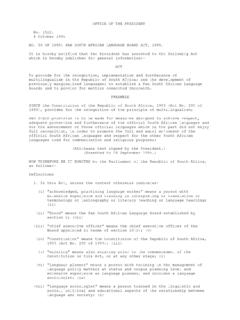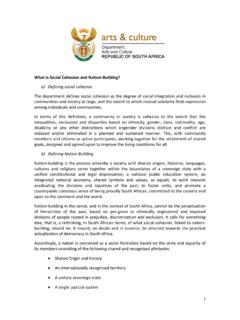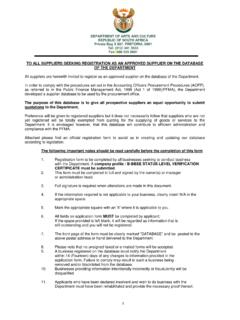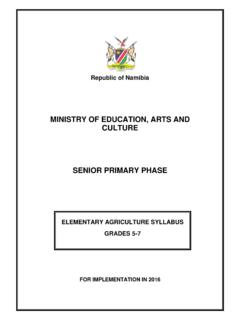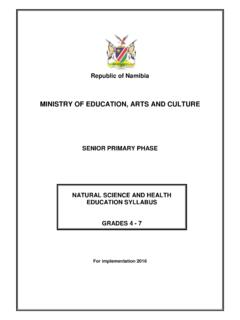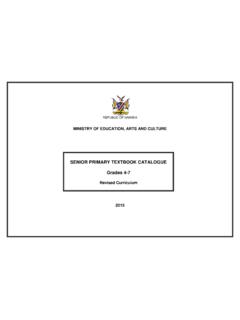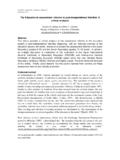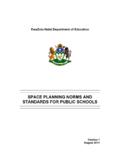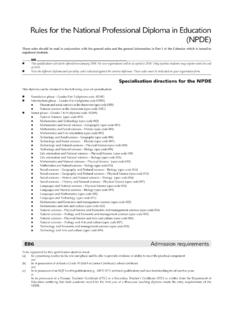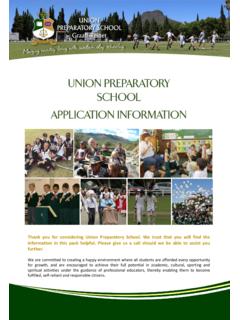Transcription of MULTILINGUAL MATHEMATICS DICTIONARY …
1 MULTILINGUAL . MATHEMATICS . DICTIONARY . grade R - 6. Second Edition March 2013. arts & culture Department: arts and culture REPUBLIC OF SOUTH AFRICA. arts & culture Department: arts and culture REPUBLIC OF SOUTH AFRICA. MULTILINGUAL MATHEMATICS DICTIONARY . grade R - 6. ENGLISH AFRIKAANS ISIZULU ISIXHOSA SISWATI . ISINDEBELE SETSWANA SEPEDI SESOTHO - TSHIVEN A. - XITSONGA. Second Edition MARCH 2013. CONTENTS. Preface v - vi Acknowledgements vi - xii Explanatory Notes xii - xiv MATHEMATICS DICTIONARY A-Z 1 151. iii This document may be downloaded or printed for personal or educational use, on condition that this notice accompanies the text. Distribution for financial gain is not permitted.
2 Copyright remains with the Department of arts and culture (DAC) and no changes to the format or content of this document may be made without the permission of the copyright holder. iv PREFACE. MATHEMATICS . School Projects In General The Terminology Coordination Section's (TCSs) primary focus with the school projects is the documentation of existing terminology, and facilitation of the development of terminology in the African languages for new concepts that appear in the teaching materials for Grades 1 to 6. Eight learning areas are incorporated in Curriculum 2005. These learning areas are MATHEMATICS , Natural Science and Technology, Human, Social, Economic and Management Sciences, arts and culture , Life Orientation and Languages.
3 About this edition This glossary of terms compiled by the TCS of a school subject in all the official languages is the first of its kind. Approximately 1 000 entries have been documented for this project. The team who worked on the terms considers it part of a learning process also for themselves. The different collaborator groups, the team members of which are all first language speakers of the particular target languages, added term equivalents. Part of the process was to supply the collaborators with definitions and/or example sentences for the English terms. The terms were researched in different dictionaries and on the Internet, and sometimes a new definition was written which included elements of the different dictionaries that were consulted.
4 All the dictionaries that were consulted in the research phase were meticulously acknowledged on the database. The aim of documenting the information in existing dictionaries and providing new definitions was to assist the collaborators in supplying the equivalents in the indigenous languages. In cases where there were no existing terms in the indigenous languages, a new term had to be coined. The definitions and example sentences are not included in this edition. It is planned that English definitions will be included in a following edition. MATHEMATICS Since it may be argued that mathematical terms lie on a continuum the terminological data was collected from relevant teaching materials used in grade 1 up to grade 6.
5 MATHEMATICS is generally referred to as Numeracy Skills in Grades 1 to 3. In these grades a number of general terms such as match, choose, fill in, light, heavy etc. are included. To teach the learners about space and position many prepositions such as like, behind, on, under, etc. are included. Learners have to learn about measurements, capacity, height, weight, length, shapes, and patterns. In the context of MATHEMATICS terms such as long, tall, wide, full, half-full and even cup (measurement: 250 ml) have a mathematical meaning, and are thus included in the list, although it might be argued that they are general words in other contexts. In order to read the time on a clock the learners need to know that hand may be used to indicate the hand of a clock (long hand, short hand) and they learn that even a clock has a face.
6 Learners also have to learn how to use a calculator. It is sometimes difficult to decide on the status (general words or subject specific terms). of lexical items in school texts, and that is why many terms used in teaching MATHEMATICS at primary level are regarded to be ordinary words, but are nevertheless included in the glossary. As from grade 4 upwards the subject is generally referred to as MATHEMATICS . Purely mathematical terms are limited. The bulk of the terms stay the same throughout the grades although v the manner in which they are used becomes progressively more difficult for each consecutive learning phase. Terms such as triangle, circle, square and rectangle are already introduced on a very elementary level in the lower grades; the learners have only to recognise the shapes.
7 We hope that these endeavours will encourage, and indeed also make a contribution towards mother-tongue education for all speech communities in SA. The Editorial Committee does not claim this product to be comprehensive or entirely without errors and scope for improvement. Feedback, especially on the layout, the accuracy of the equivalents and the comprehensiveness of the DICTIONARY will be welcomed. ACKNOWLEDGEMENTS. The National Language Service of the Department of arts and culture would like to thank Mrs Genny Geekie, for her very valuable input in editing the definitions and example sentences. These definitions provided essential information, facilitating the collaborators when they were adding the equivalents.
8 We would also like to thank Mr Koos de Wet for his input. A word of special thanks and appreciation go to each and every member of the Working and Editorial Committees who voluntarily worked on this project. Without their valuable inputs this data corpus would not have been possible. The trained collaborators in the provinces were of great assistance to the project as they supplied the most accurate term equivalents in their mother-tongues. These groups consisted of first language speakers of the target languages who are experts in the field of teaching MATHEMATICS and its applications. The collaborators also included linguists, translators and lexicographers of the respective languages.
9 As their involvement from the beginning of the process was critical to the success of the MULTILINGUAL MATHEMATICS DICTIONARY , it is deemed necessary that all the collaborators who participated in adding the equivalents for their particular languages be appropriately acknowledged. We would also like to extend our gratitude to the following collaborators who committed themselves for this project and who worked extended hours in contributing to this terminological data corpus. Collaborators for IsiZulu Dr NF Biyela Linguist, University of Zululand Dr TI Biyela Linguist, University of Zululand Ms TL Cebekhulu Terminologist, National Language Service Mr ES Chiliza Postgraduate, University of Durban Westville Mr BR Dlamini Educator, Sibhakuza High School Prof.
10 ZLM Khumalo Linguist, University of Zululand Dr BC Khuzwayo Translator, University of Zululand Mr EM Mabuza Linguist, University of South Africa Mr ZJ Mashiyane Linguist, University of Zululand Prof. LF Mathenjwa Linguist, University of Zululand Ms CC Mbatha Postgraduate, University of Durban Westville Mr MO Mbatha Lexicographer, NLU. vi Ms SDD Mbokazi Educator, Ongoye High School Mr TJ Mbuli Postgraduate, University of Zululand Ms PTG Mkhize Linguist, University of Durban Westville Ms FEM Mnguni Educator, Vulindlela Primary School Ms TG Mnomiya Postgraduate, University of Durban Westville Mr HB Msomi Postgraduate, University of Durban Westville Ms TP Mteshane Postgraduate, University of Durban Westville Dr NP Ndimande Linguist, University of Durban Westville Prof.



